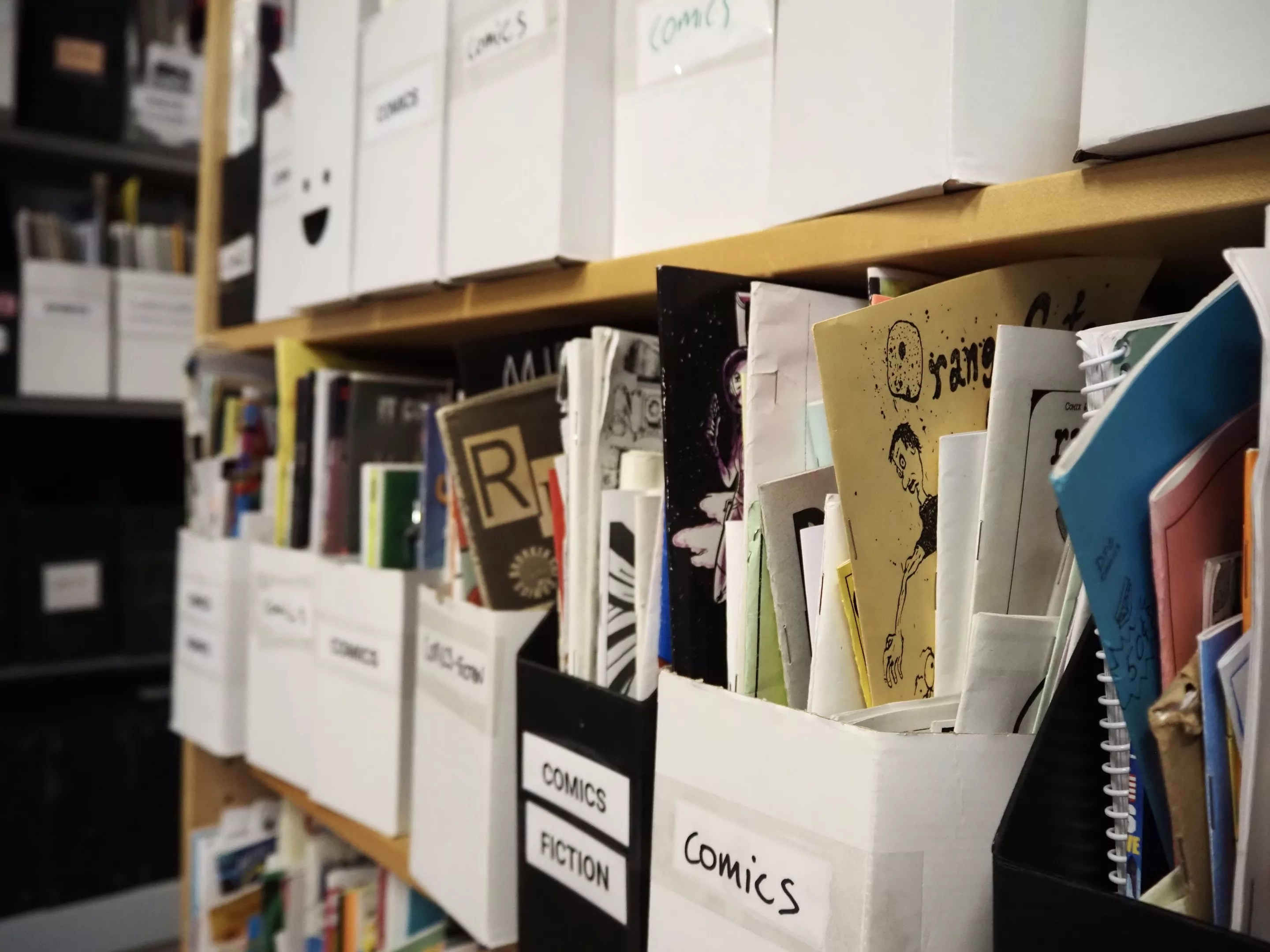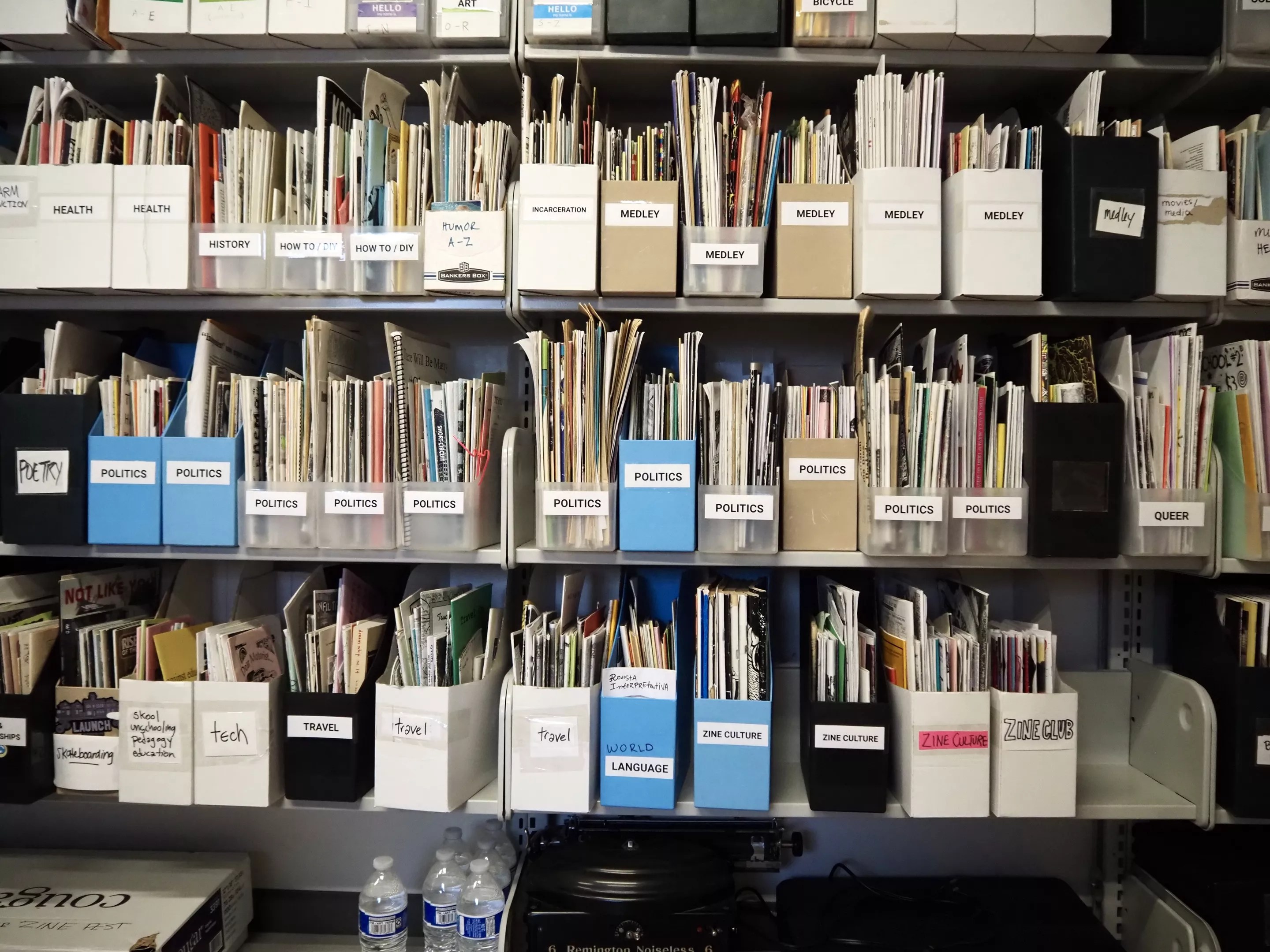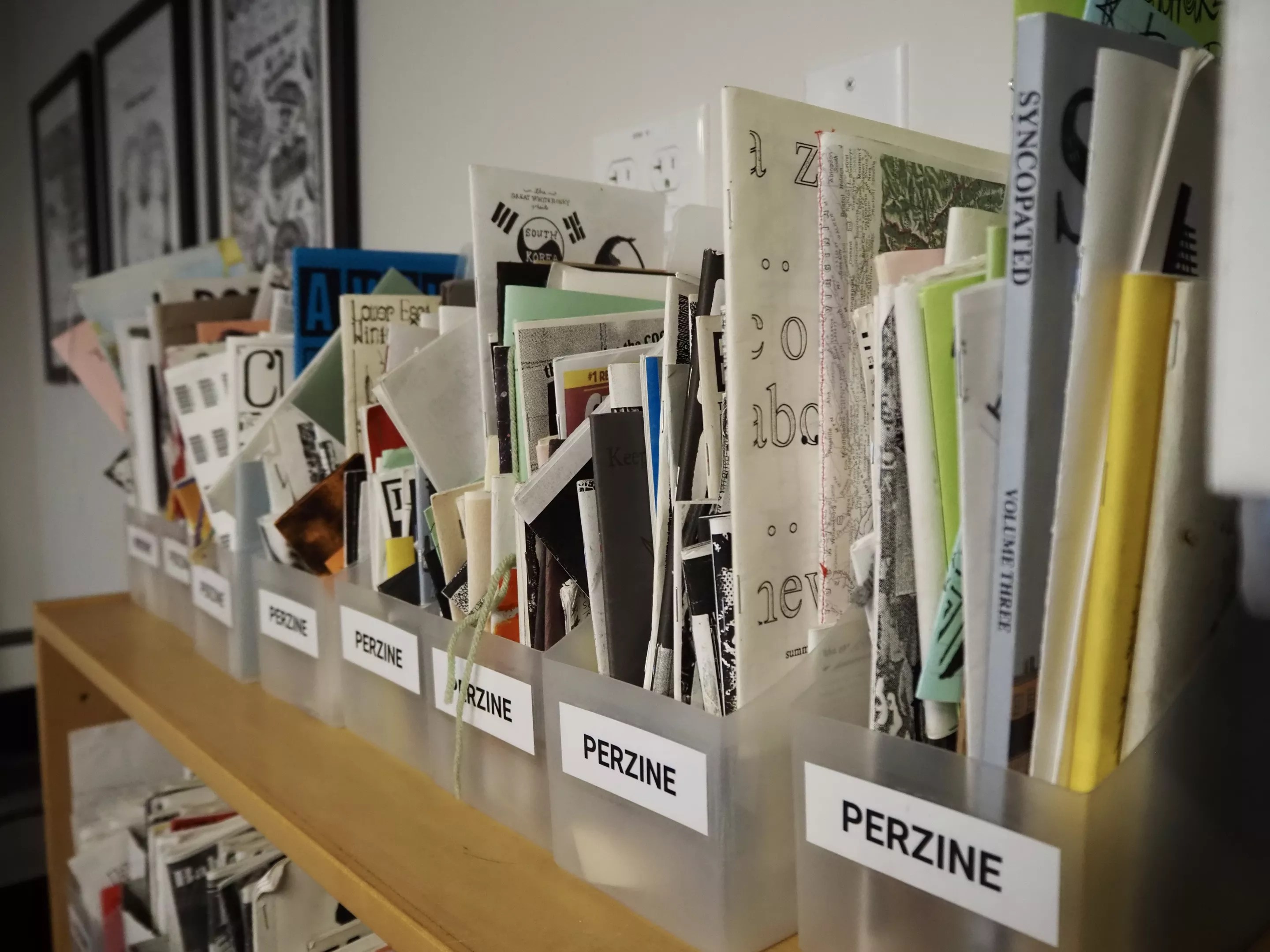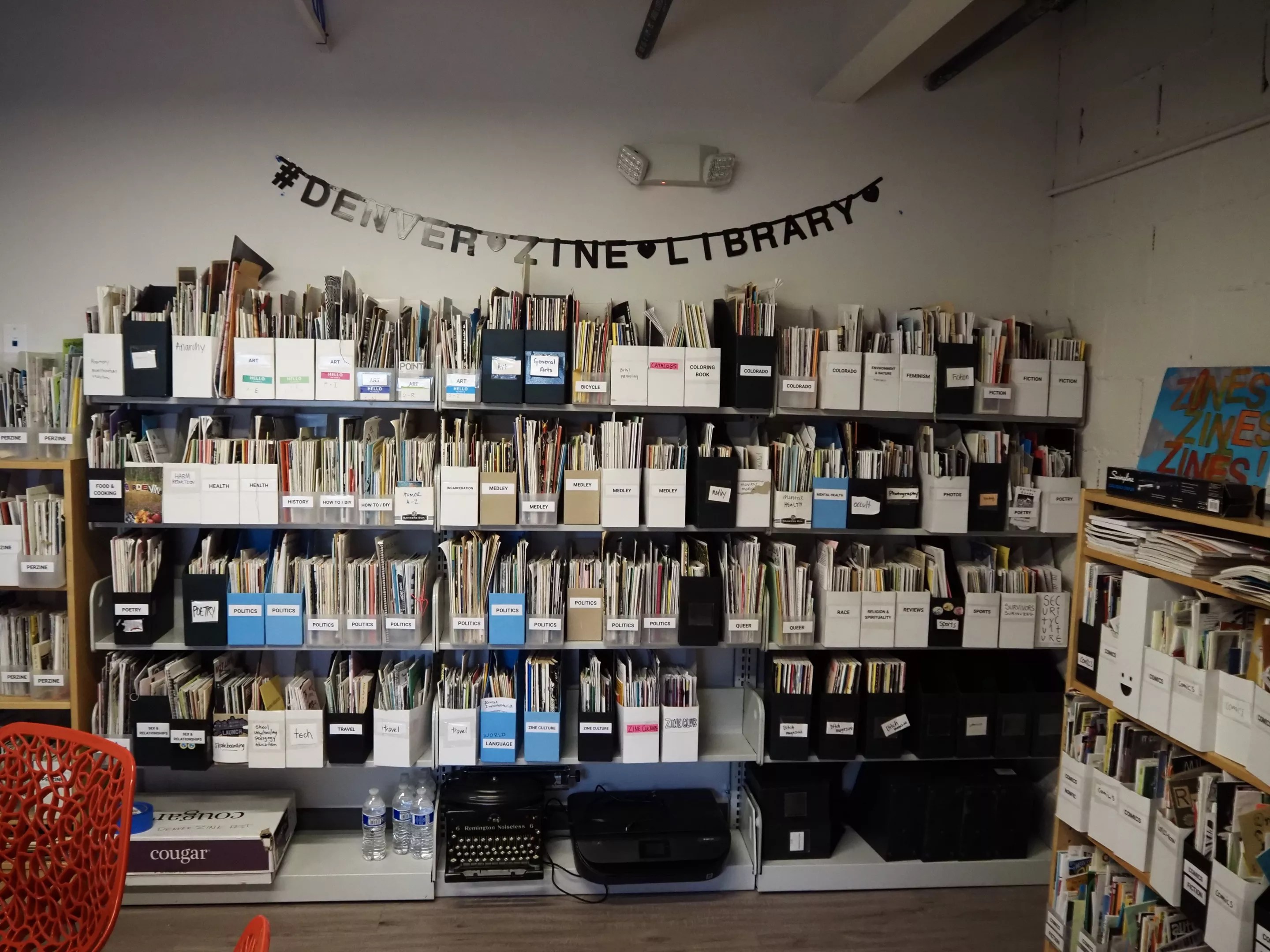
Kristen Fiore

Audio By Carbonatix
One of the strangest zines donated to the Denver Zine Library during Vera Benschop’s eight years volunteering there was Rock Book. “It was just an envelope full of rocks,” she recalls.
But the truth is, a zine can be anything. “Nobody can tell you what to write, nobody can tell you what you can publish, they can’t tell you your opinion’s wrong,” Benschop says. “It’s a really great way to spread information in a more analog way as stuff on the internet gets…weirder.” And no zine is too weird for the Zine Library, a volunteer-run room in the Denver Public Library’s Bob Ragland branch that houses shelves of around 20,000 zines – all donated and all available for checkout on Saturdays when the DZL is open.

There’s no Dewey Decimal System in the Denver Zine Library. Instead, zines are categorized by genre.
Kristen Fiore
Find out what a zine means for yourself this Sunday, September 14, when seasoned zinesters and curious newcomers alike will gather at the DPL’s Central Library branch for the DZL’s 2025 Denver Zine Fest, featuring nearly 100 zine exhibitors from Colorado and beyond. “There will be a zine-making station, and we worked pretty hard to make sure there’s a good mix of newer zinesters, comic artists, photography people, DIY and political zines,” says Benschop, who helps with exhibitor coordination for Zine Fest. “We have a nice spread of what zine culture is really about.”
And what is Zine culture about? “It’s a super-independent, free way of saying whatever you want,” Benschop explains. “I think it’s so important that people have and actually harness their free speech now.”
Zine-making dates back to the 1930s and ’40s, according to the Amon Carter Museum of American Art, but became popular in the ’70s when copy shops became widely available. Zine collectors Kelly Costello and Jamez Terry founded the Denver Zine Library after moving to the Mile High City in 2003, originally operating it from a small shed behind their home in the Baker neighborhood. That arrangement didn’t last for very long; after a neighbor complained to the City of Denver about the volume of people visiting, Costello and Terry received a cease-and-desist order and began looking for a new space.
Over the past two decades, the DZL has moved around a lot and even closed for two years during the COVID-19 pandemic. It reopened in 2022 at its current location, and Benschop says it’s been “amazing” to have the partnership with DPL, which was organized by DPL Community Outreach Manager and longtime volunteer zine librarian Hanna Zittel.
“That’s how we managed to get such an amazing venue this year [for the Zine Festival] and are glad to have DPL as a sponsor of our event,” Benschop says, adding that DZL survives as an organization by getting sponsorships from time to time.
“We sell a lot of merch at the fest, which helps us out, and we’ve had partnerships in the past, like with Meow Wolf,” she says. “It’s volunteer-run. People give what they can – time, or otherwise.”
With the DLZ now settled in a permanent home, volunteers are working to digitally catalog its thousands of zines. “There’s no Dewey Decimal System here,” Benschop says, gesturing at the shelves of zines behind her, sitting in boxes labeled with genres like poetry, photography, art, politics, health, history, religion, race, skateboarding, music, comics, travel and tech.
“I like the discovery of looking through the zine library, but if you are looking for something specific, it’s terrible,” Benschop admits. “So we’re trying to get all of the stats and the covers and titles online so they can be searched.”

Zines are donated by local creators and zinesters from out of state.
Kristen Fiore
The DZL’s collection started with Costello and Terry’s own assortment of 2,000 zines and dates back to zines from the ’90s. While Terry doesn’t live in Denver anymore, Costello helps coordinate Zine Fest, which has been an event since 2007, and manages the library’s operations.
The collection is growing all the time, and every single zine is donated. People from near and far mail items to the DZL, “but we love when people drop them off in person,” Benschop says. “We have a form so that people can categorize their own zine.” Sometimes, visitors donate their whole collections. “The most fun part of volunteering in the library is that people will come in from out of town and be like, ‘I brought you some of my zines for your collection,'” Benschop adds.
Since a lot of the zines are text-heavy and people want to have time to look at them, visitors to the DZL can check out five zines at a time for up to three weeks.
The DZL also hosts a Zine Club on the last Saturday of the month. Each one has a theme, so members come prepared with their pages to create that month’s community zine, or people just show up to hang out with other zine makers and work on their own stuff. The library also occasionally hosts zine workshops to teach kids or adults how to make zines, and is hosting “The Zine Scene” workshop at 5 p.m. Thursday, September 4, for the revived One Book One Denver program.
Denver’s zine community in Denver is pretty big, Benschop says. “People really come together and rally for things that are important,” she notes. “Mutiny moved, but people are still going. The fact that people come every single time I have a shift here means that people do care about zines and want to know more. It’s a pretty good group of people in Denver.”
When people come into the library, Benschop likes to ask if they make zines. “And they say, ‘No, but I’ve always wanted to,'” Benschop says. “I want them to see what there is to be seen and be like, ‘I can do that,’ and just do it for themselves.” Sometimes they donate their creations to the library.
With the Zine Fest at the Central Library for the first time, Benschop is hoping for a big turnout – especially since this space is bigger and more accessible than previous venues, some of which didn’t have air conditioning. She estimates that 70 percent of this year’s Zine Fest exhibitors live in Colorado, while the other 30 percent are coming from out of state. “We get a really good amount of people applying from out of state, and even repeat vendors from out of state, so that’s a good sign for us.”

Denver Zine Library has about 20,000 zines, and the collection is growing all the time.
Kristen Fiore
Those inspired by the fest to get more involved with the zine community can sign up to volunteer at the library by filling out a form on the DZL’s website. “Kelly will reach out to schedule an orientation. You’ll come in person and we’ll show you all the stuff,” Benschop says. “We have a little volunteer manual zine. Once you’ve done your orientation, you can sign up for regular shifts. We have two shifts per Saturday. The main thing for our volunteers is keeping the library open so people can come visit.”
But for now, there’s a community to connect with and new things to learn at Zine Fest.
“Zines are weirder and less easy to define than you’d think,” Benschop says. “It’s worth checking out. If you’ve never experienced zines, it’ll be a treat.”
Denver Zine Fest runs from 11 a.m. to 5 p.m. Sunday, September 14, at Denver Central Library, 10 West 14th Avenue Parkway. Denver Zine Library is located at the Bob Ragland Branch Library at 1900 35th Street, and open from 10 a.m. to 5 p.m. Saturdays. Learn more at denverzinelibrary.org and connect with the Zine Club by following @denverzinelibrary on Instagram.